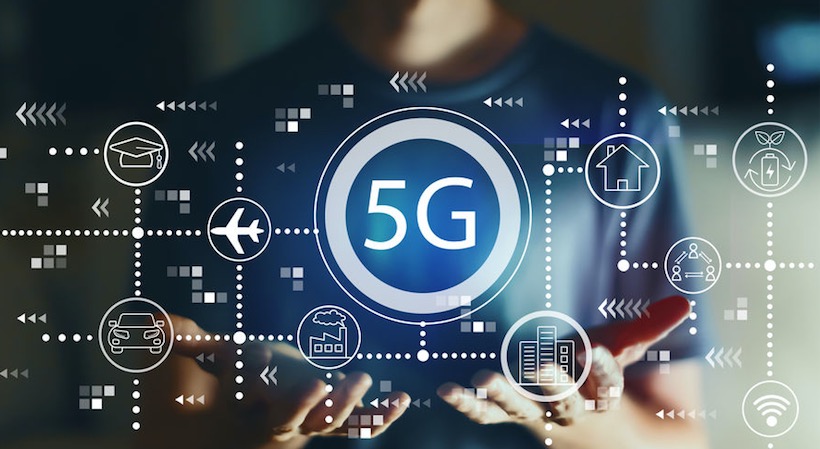The remote work phenomenon is well underway. More and more companies across industries are realizing the multitude of benefits that come from going remote, not least of which are an upturn in employee productivity and job satisfaction. In fact, remote work is gaining such prominence that Stanford economics professor Nicholas Bloom compared it to the driverless car as one of the biggest innovations of our age. And while the trend continues to rise, it’s about to seriously accelerate with the advent of 5G.
5G means significantly reduced latency and faster upload speeds, which have already reached up to 500 megabytes per second – a massive increase from Q1 2019’s average of 9.75 megabytes per second in the U.S.
Once 5G becomes widespread (5G is already available in certain parts of the U.S. and South Korea), remote work will not only be made easier for those already telecommuting, it will also open up new opportunities for entrepreneurs across industries to take part in this sweeping movement and reap its many rewards.
Let’s take a look at the ways in which we can expect 5G to upgrade the remote work revolution in 2020 and beyond.
5G will change the VR game
When most of us hear the term virtual reality (VR), we think of futuristic media consumption or video games, not professional use cases. However, with 5G, the capabilities of VR will increase exponentially, allowing for remote training and workplace collaboration on a level we haven’t seen before.
Gone will be the days of conference calls interrupted by frozen screens and slow connections. VR will enable employees to feel like they are right there alongside remote team members, with executives able to attend multiple meetings “in” different locations on the same day.
Thanks to 5G powered VR, real-time collaboration will allow remote entrepreneurs to maximize productivity, facilitating work on projects that would usually require a physical presence. VR could even go so far as to allow for immersive remote team-building events: perfect for those startups with a globally-dispersed team.
Related: Detroit Startup Week feat. Kyle Bazzy and Marc Hudson
Remote workers will be even more geographically liberated
Right now, remote workers are constrained by slow speeds and patchy WiFi while on the move, limiting them from truly being able to work from anywhere. With 5G, remote workers will not only be able to seamlessly stay in touch no matter where they are, but also access cloud data and share large files without a delay.
Whether they’re constantly traveling or working from a remote area, 5G coverage will allow entrepreneurs to connect and collaborate in real-time, driving productivity and drastically reducing any time wasted while trying to work with a bad connection.
With the lift of geographical constraints thanks to 5G, increasing numbers of organizations will “go remote” and subsequently gain access to a much larger talent pool than they had before. Not only does this flexibility allow companies to hire better, but it also allows jobseekers to find the best-suited role and company for them, increasing job satisfaction among the remote worker population.
5G will create new opportunities for remote work
While we currently witness remote work growing in popularity across digital industries, 5G will enable the phenomenon to spread to other areas where employees traditionally need to be physically present, such as manufacturing and healthcare.
In manufacturing, 5G will connect remote experts to plants and factories thousands of miles away. Specialists will be able to operate robots and machines in real-time from virtually anywhere, with latency as low as two milliseconds. They’ll also be able to virtually survey the factory floor and conduct operational checks thanks to augmented capabilities, as well as provide training that previously needed to be done in-person.
We can also see the beginnings of this in healthcare, as doctors in China used 5G to perform the world’s first remote surgery on a human, inserting a stimulation device into the brain of a Parkinson’s patient that was nearly 1,900 miles away. This kind of futuristic innovation will only develop further as 5G becomes available for widespread use across sectors.
Sign Up: Receive the StartupNation newsletter!
Organizations need to act responsibly
As 5G increases the opportunity for entrepreneurs to truly work whenever and from wherever, companies that adopt a remote-first policy need to make sure this goes hand-in-hand with the right company culture.
With increased flexibility and accessibility comes the risk that employees will be tempted to be constantly connected, available and working, leading to a dangerous phenomenon that has already taken hold amongst millennials: burnout. Startups that reap the rewards of remote work need to be hyper-aware of this risk, and should promote a good work-life balance amongst their employees.
Successfully leading a remote team can also require extra effort to maintain a collaborative company culture. Remote workers can often feel isolated from the rest of their team, so encouraging an environment of open communication and holding non-work-related remote events such as virtual game nights will help foster a sense of community and belonging.
The widespread adoption of 5G will no doubt have profound effects on the nature of modern workforces, not only accelerating the remote work phenomenon in sectors where it is already underway, but also opening up new doors within industries where it is yet to take hold.
With the opportunity to drive productivity, worker satisfaction and company revenue, entrepreneurs should be excited about the effects of 5G on remote work. However, this must go hand-in-hand with a company culture that promotes communication and a healthy work-life balance for organizations that want to make the most of this booming trend.






